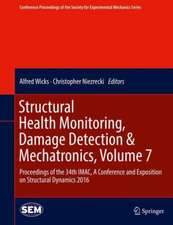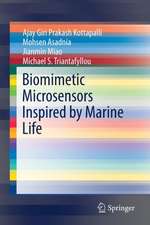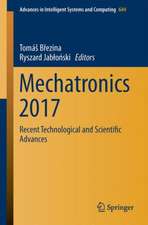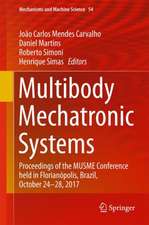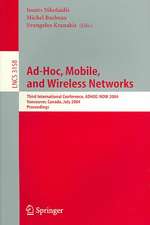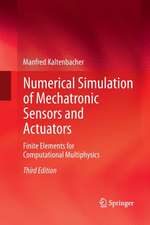Building Sensor Networks: From Design to Applications: Devices, Circuits, and Systems
Editat de Ioanis Nikolaidis, Krzysztof Iniewskien Limba Engleză Hardback – 19 sep 2013
From Design Practices to the Networking Protocols that Glue Applications Together
Organized into three sections, the book presents insights from international experts representing both industry and academia. The first section, on design practices, explores alternative ways to approach the tasks of developing a suitable WSN solution to an application and assisting that development in a manner that is not necessarily tied to a particular application. The second section, on networking protocols, illustrates the impact of the intermediaries—the "glue" of putting applications together. Chapters look at ways to address traffic, delays in network clustering, and the coexistence of a WSN with other systems on a frequency band. The final section of the book delves into experiences with applications in chemical sensing, defense, global trade and security, and ecosystem monitoring. Although these applications may fail the purist definition of an ideal WSN, they offer valuable lessons for the future development and deployment of WSNs.
Challenge Your Thinking about Designing WSN Applications
Emphasizing the need to build applications, the contributors present examples of what applications of WSNs could look like and identify the constraints. Throughout, the book challenges and illuminates your thinking about how to tame the complexity of designing a WSN application. It is essential reading for anyone interested in future wireless technologies.
| Toate formatele și edițiile | Preț | Express |
|---|---|---|
| Paperback (1) | 456.63 lei 6-8 săpt. | |
| CRC Press – 29 mar 2017 | 456.63 lei 6-8 săpt. | |
| Hardback (1) | 1100.25 lei 6-8 săpt. | |
| CRC Press – 19 sep 2013 | 1100.25 lei 6-8 săpt. |
Din seria Devices, Circuits, and Systems
- 8%
 Preț: 390.20 lei
Preț: 390.20 lei - 8%
 Preț: 542.61 lei
Preț: 542.61 lei - 8%
 Preț: 404.83 lei
Preț: 404.83 lei - 29%
 Preț: 1019.63 lei
Preț: 1019.63 lei - 30%
 Preț: 889.43 lei
Preț: 889.43 lei - 20%
 Preț: 1165.92 lei
Preț: 1165.92 lei - 26%
 Preț: 456.63 lei
Preț: 456.63 lei - 30%
 Preț: 878.42 lei
Preț: 878.42 lei - 18%
 Preț: 1552.73 lei
Preț: 1552.73 lei - 28%
 Preț: 1307.37 lei
Preț: 1307.37 lei - 30%
 Preț: 850.59 lei
Preț: 850.59 lei - 18%
 Preț: 751.07 lei
Preț: 751.07 lei - 29%
 Preț: 1097.55 lei
Preț: 1097.55 lei - 27%
 Preț: 427.84 lei
Preț: 427.84 lei - 27%
 Preț: 429.30 lei
Preț: 429.30 lei - 18%
 Preț: 1118.65 lei
Preț: 1118.65 lei - 26%
 Preț: 1406.48 lei
Preț: 1406.48 lei - 31%
 Preț: 681.15 lei
Preț: 681.15 lei - 30%
 Preț: 851.82 lei
Preț: 851.82 lei - 18%
 Preț: 1391.72 lei
Preț: 1391.72 lei - 26%
 Preț: 456.63 lei
Preț: 456.63 lei - 27%
 Preț: 456.63 lei
Preț: 456.63 lei - 34%
 Preț: 391.84 lei
Preț: 391.84 lei - 29%
 Preț: 1107.18 lei
Preț: 1107.18 lei - 25%
 Preț: 524.78 lei
Preț: 524.78 lei - 30%
 Preț: 769.51 lei
Preț: 769.51 lei - 31%
 Preț: 408.36 lei
Preț: 408.36 lei - 30%
 Preț: 848.98 lei
Preț: 848.98 lei - 18%
 Preț: 846.43 lei
Preț: 846.43 lei - 22%
 Preț: 415.43 lei
Preț: 415.43 lei - 30%
 Preț: 857.50 lei
Preț: 857.50 lei - 31%
 Preț: 1088.40 lei
Preț: 1088.40 lei - 31%
 Preț: 838.82 lei
Preț: 838.82 lei - 30%
 Preț: 828.89 lei
Preț: 828.89 lei - 25%
 Preț: 884.86 lei
Preț: 884.86 lei - 35%
 Preț: 489.62 lei
Preț: 489.62 lei - 23%
 Preț: 456.63 lei
Preț: 456.63 lei - 26%
 Preț: 821.13 lei
Preț: 821.13 lei - 25%
 Preț: 496.94 lei
Preț: 496.94 lei - 28%
 Preț: 881.69 lei
Preț: 881.69 lei - 29%
 Preț: 1100.66 lei
Preț: 1100.66 lei
Preț: 1100.25 lei
Preț vechi: 1556.16 lei
-29% Nou
Puncte Express: 1650
Preț estimativ în valută:
210.56€ • 219.02$ • 173.83£
210.56€ • 219.02$ • 173.83£
Carte tipărită la comandă
Livrare economică 14-28 aprilie
Preluare comenzi: 021 569.72.76
Specificații
ISBN-13: 9781466562721
ISBN-10: 1466562722
Pagini: 312
Ilustrații: 98 b/w images, 23 tables and 92
Dimensiuni: 156 x 234 x 20 mm
Greutate: 0.57 kg
Ediția:New.
Editura: CRC Press
Colecția CRC Press
Seria Devices, Circuits, and Systems
ISBN-10: 1466562722
Pagini: 312
Ilustrații: 98 b/w images, 23 tables and 92
Dimensiuni: 156 x 234 x 20 mm
Greutate: 0.57 kg
Ediția:New.
Editura: CRC Press
Colecția CRC Press
Seria Devices, Circuits, and Systems
Public țintă
Electrical engineers working with wireless communications and sensor devices, systems, equipment, and services; network engineers; sensor and hardware technology professionals; researchers and graduate students in these areas.Cuprins
Introduction. Design Practices: Dynamic Profiling and Optimization Methodologies for Sensor Networks. Stochastic Inference in Wireless Sensor Networks. Implementation of Wireless Sensor Network Systems with PN-WSNA Approaches. Real-Time Search in the Sensor Internet. Networking Protocols: Traffic Management in Wireless Sensor Networks. Decision-Tree Construction for Event Classification in Distributed Wearable Computers. A Network Structure for Delay-Aware Applications in Wireless Sensor Networks. Distributed Modulation Classification in the Context of Wireless Sensor Networks. Application Experiences: Challenges in Wireless Chemical Sensor Networks. Low-Power, Extensive Sensor Networks from the Wired Perspective. Maritime Data Management and Analytics: A Survey of Solutions Based on Automatic Identification System. Above and Below the Ocean Surface: A WSN Framework for Monitoring the Great Barrier Reef. Index.
Notă biografică
Ioanis Nikolaidis is a professor in the Department of Computing Science and an adjunct professor in the Department of Occupational Therapy at the University of Alberta. His research interests are in computer network protocol modeling and simulation, network protocol performance, and wireless sensor network architectures and applications. He has published 90 papers in refereed journals and conferences, as well as four book chapters, and is the editor of IEEE Network magazine. He has cochaired the CNSR 2011 and ADHOC-NOW 2004 and 2010 conferences and has served as a technical program committee member and reviewer for numerous conferences and journals, as well as for several funding agencies. He is currently a steering committee member for the annual WLN workshop and ADHOC-NOW conference. He is a member of IEEE and a lifetime member of ACM.
Krzysztof (Kris) Iniewski manages R&D at Redlen Technologies, Inc., a start-up company in Vancouver, Canada. He is also a president of CMOS Emerging Technologies Research Inc., an organization of high-tech events covering communications, microsystems, optoelectronics, and sensors. Dr. Iniewski has held numerous faculty and management positions at the University of Toronto, the University of Alberta, Simon Fraser University, and PMC-Sierra, Inc. He has published more than 100 research papers in international journals and conferences. He holds 18 international patents granted in the United States, Canada, France, Germany, and Japan. He is a frequent invited speaker, has consulted for multiple organizations internationally, and has written and edited several books.
Krzysztof (Kris) Iniewski manages R&D at Redlen Technologies, Inc., a start-up company in Vancouver, Canada. He is also a president of CMOS Emerging Technologies Research Inc., an organization of high-tech events covering communications, microsystems, optoelectronics, and sensors. Dr. Iniewski has held numerous faculty and management positions at the University of Toronto, the University of Alberta, Simon Fraser University, and PMC-Sierra, Inc. He has published more than 100 research papers in international journals and conferences. He holds 18 international patents granted in the United States, Canada, France, Germany, and Japan. He is a frequent invited speaker, has consulted for multiple organizations internationally, and has written and edited several books.
Descriere
For all the interest that wireless sensor networks (WSNs) have created over the past decade, there are few examples to show that they are truly delivering on this promise. What is missing? Deviating from the usual focus on routing and energy efficiency, this book explores the path from conceptual development to actual applications. It gives examples of what applications of WSNs could look like, identifies constraints, and highlights lessons learned from existing applications. Throughout, this book challenges your thinking about how to design a WSN application.






